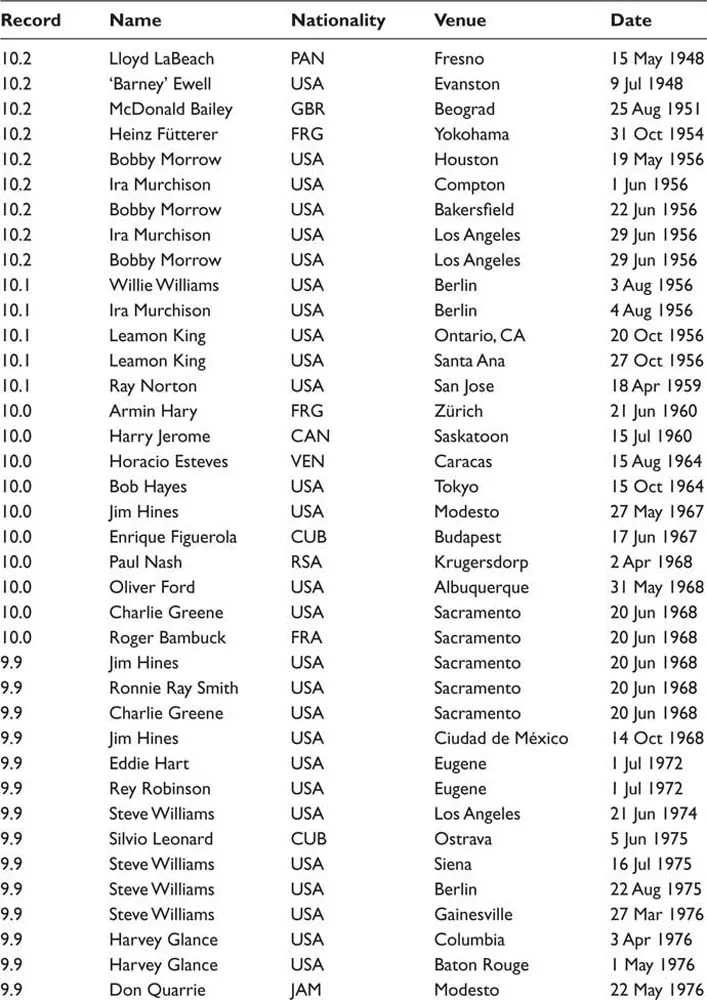![]()
CHAPTER 1
AN INTRODUCTION TO THE SCIENCE OF SPRINTING
by Dr Geoffrey K. Platt
This book is about running as fast as is humanly possible. Some of the best sprinters in the world have combined with some of the best coaches and some of the best injury specialists and some of the best sports scientists to review recent work in the area, and to give their best advice on the direction in which sprinting should develop over the next twenty years.
Since the 1880s, sport has become organized, structured and very competitive. Athletes are no longer the only participants in sport who want to be the best in their field: now coaches, administrators, technical officials, even sports doctors devote their lives, night and day, to being as good as they can be.
THE BACKGROUND TO SPORTS SCIENCE
The end of World War II in 1945 saw the formation of the German Democratic Republic (GDR) – East Germany. Sitting in the shadow of the much larger Federal German Republic (FDR) – West Germany – the East Germans were keen to show what they could do, and that they could compete against their much larger neighbours. They established the best sports-science set-up that the world has ever seen.
In 1981, Australia formed the Australian Institute of Sport (AIS), which has been ‘the cradle of Australia’s national sports system – one that is recognized the world over for its ability to identify, develop and produce world, Olympic and Paralympic champions’. The Australians showed that sports science research was not limited to Eastern Europe, and also demonstrated what could be achieved in sports performance with strong investment.
In 2002, England started the English Institute of Sport, with similar organizations in each of the other Home Countries, and ‘Olympic sports have leapt ahead and are leading the way in the appliance of expertise, and this is down to the breadth of experts they employ, many of whom have been young graduates employed in specific roles.’
In the words of Sir Dave Brailsford, Performance Director of British Cycling, ‘Sport science and medicine are inextricably linked to performance and are areas that British Cycling has continued to embrace.’
In this book, leading athletes, coaches, injury specialists and sports scientists will explain the science and medicine that will move sprinting forwards over the next twenty years.
Definition of Terms
No introduction would be complete unless it defines the terms on which it relies:
Science is defined as ‘A systematic study using observation, experiment and measurement, of physical and social phenomena, or any specific area involving such a study.’
Sprinting is defined as ‘A run of short distance which can be covered at top speed in one continuous effort.’
‘Study the past if you would define the future.’ – Confucius (551bc–479bc).
Men
The International Olympic Committee (IOC) and the International Association of Athletics Federation (IAAF) recognize three sprinting events for both men and women for outdoor competition: 100 metres, 200 metres and 400 metres.
ATHLETICS – WORLD RECORDS
World records for athletics were first officially recognized by the IAAF in 1913. Initially, records were accepted for ninety-six men’s events; this list has been reduced at various times, including the elimination of imperial distances (except the 1 mile), in 1977. From 1977, all records at sprint distances up to 400 metres have only been accepted if timed fully automatically. Prior to that date the best hand-timed results have been listed.
100 Metres
Fig. 1.1: The progression of the IAAF World Record for the Men’s 100m (blue line). The best-fit straight line is in black. The best-fit curve ...




